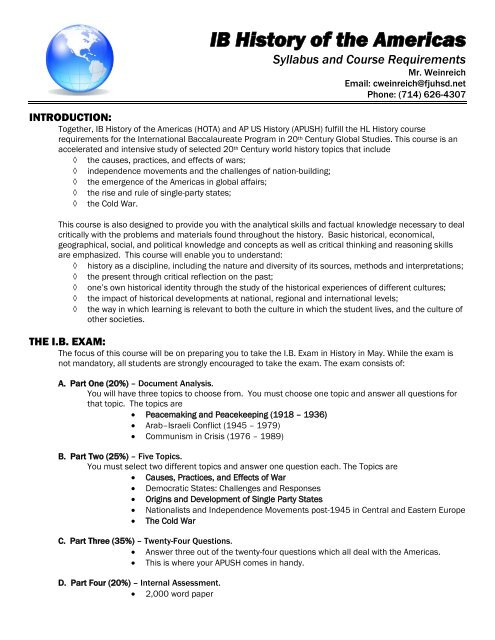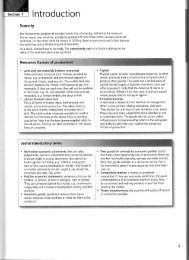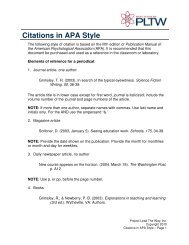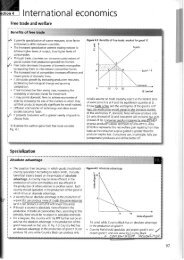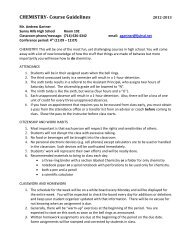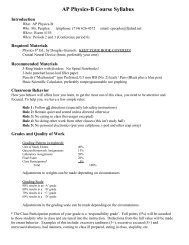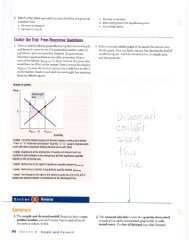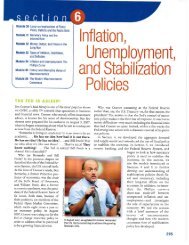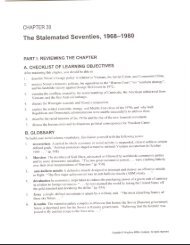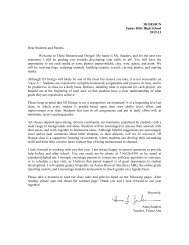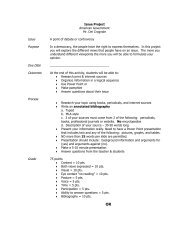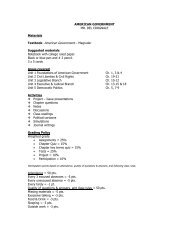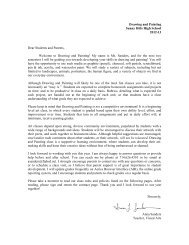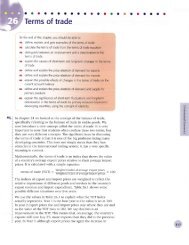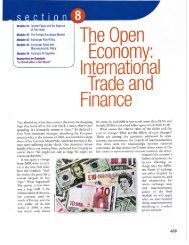HOTA Course Syllabus - Sunny Hills High School
HOTA Course Syllabus - Sunny Hills High School
HOTA Course Syllabus - Sunny Hills High School
Create successful ePaper yourself
Turn your PDF publications into a flip-book with our unique Google optimized e-Paper software.
IB History of the Americas<br />
<strong>Syllabus</strong> and <strong>Course</strong> Requirements<br />
Mr. Weinreich<br />
Email: cweinreich@fjuhsd.net<br />
Phone: (714) 626-4307<br />
INTRODUCTION:<br />
Together, IB History of the Americas (<strong>HOTA</strong>) and AP US History (APUSH) fulfill the HL History course<br />
requirements for the International Baccalaureate Program in 20 th Century Global Studies. This course is an<br />
accelerated and intensive study of selected 20 th Century world history topics that include<br />
the causes, practices, and effects of wars;<br />
independence movements and the challenges of nation-building;<br />
the emergence of the Americas in global affairs;<br />
the rise and rule of single-party states;<br />
the Cold War.<br />
This course is also designed to provide you with the analytical skills and factual knowledge necessary to deal<br />
critically with the problems and materials found throughout the history. Basic historical, economical,<br />
geographical, social, and political knowledge and concepts as well as critical thinking and reasoning skills<br />
are emphasized. This course will enable you to understand:<br />
history as a discipline, including the nature and diversity of its sources, methods and interpretations;<br />
the present through critical reflection on the past;<br />
one’s own historical identity through the study of the historical experiences of different cultures;<br />
the impact of historical developments at national, regional and international levels;<br />
the way in which learning is relevant to both the culture in which the student lives, and the culture of<br />
other societies.<br />
THE I.B. EXAM:<br />
The focus of this course will be on preparing you to take the I.B. Exam in History in May. While the exam is<br />
not mandatory, all students are strongly encouraged to take the exam. The exam consists of:<br />
A. Part One (20%) – Document Analysis.<br />
You will have three topics to choose from. You must choose one topic and answer all questions for<br />
that topic. The topics are<br />
Peacemaking and Peacekeeping (1918 – 1936)<br />
Arab–Israeli Conflict (1945 – 1979)<br />
Communism in Crisis (1976 – 1989)<br />
B. Part Two (25%) – Five Topics.<br />
You must select two different topics and answer one question each. The Topics are<br />
Causes, Practices, and Effects of War<br />
Democratic States: Challenges and Responses<br />
Origins and Development of Single Party States<br />
Nationalists and Independence Movements post-1945 in Central and Eastern Europe<br />
The Cold War<br />
C. Part Three (35%) – Twenty-Four Questions.<br />
Answer three out of the twenty-four questions which all deal with the Americas.<br />
This is where your APUSH comes in handy.<br />
D. Part Four (20%) – Internal Assessment.<br />
2,000 word paper
COURSE MATERIALS:<br />
TEXTBOOKS:<br />
1. Mastering Modern World History (4 th edition) by Norman Lowe<br />
2. Modern Latin America (6 th edition) by Thomas Skidmore and Peter Smith<br />
3. Other supplemental readings as assigned.<br />
SUGGESTED MATERIALS:<br />
3-Ring loose-leaf notebook with plenty of white, college ruled paper and room to keep everything<br />
from class – do not throw anything away!<br />
blue or black ink pens<br />
#2 pencils<br />
textbook and any other supplemental reading materials<br />
RECOMMENDED MATERIALS:<br />
1. A quality preparation guide for the IB History exam such as<br />
IB Diploma <strong>Course</strong> Companion: 20th Century World History by Oxford University Press<br />
IB Diploma <strong>Course</strong> Companion: History of the Americas by Oxford University Press<br />
Pearson Baccalaureate: History: Causes, Practices and Effects of Wars for the IB Diploma by Kelly<br />
Rogers & Jo Thomas<br />
Pearson Baccalaureate: History: The Cold War by Kelly Rogers & Jo Thomas<br />
Pearson Baccalaureate: History: 20th Century World - Authoritarian and Single Party States by<br />
Brian Mimmack, Daniela Senes, & Eunice Price<br />
Pearson Baccalaureate: History: A Comprehensive Guide to Paper One by Brian Mimmack,<br />
Daniela Senes, & Eunice Price<br />
2. Supplemental history books covering topics we will discuss such as:<br />
Paris 1919 by Margaret MacMillan (The Treaty of Versailles)<br />
The Legacy of the Great War, Peacemaking, 1919 by William R. Keylor (settlement of WWI)<br />
A People’s History of the United States 1492-Present by Howard Zinn (social history of US)<br />
A History of Latin America by Benjamin Keen & Keith Haynes (Latin American survey)<br />
The Cold War by Michael Dockrill & Michael Hopkins (a survey of 1945-1991)<br />
There are tons of other options as well!<br />
STUDENT RESPONSIBILITIES:<br />
1. Homework – Homework will be assigned daily. It is your responsibility to<br />
keep up with required reading assignments! Reading your textbooks is<br />
essential to success in this class. Students planning on receiving an A or B<br />
in this class as well as passing marks on the IB Exam (this should be<br />
everyone!) should plan on spending at least a half hour of reading nightly.<br />
2. Quizzes and Essays – Reading quizzes on assigned readings will be given<br />
weekly. There will also be at least three in-class essays at the end of major<br />
units. In addition, there will also be a comprehensive final exam at the end<br />
of each semester. Finally, your Internal Assessment will be due at the<br />
beginning of February.<br />
3. Class Participation – Your participation grade is subjective and is based on the quality and number of<br />
responses made during discussion, as well as student interaction and attentiveness to your tasks. A<br />
positive attitude, respectful demeanor, and appropriate manners are required at all times. Absences of<br />
any kind will negatively affect your participation grade – if you are not here, you cannot participate!
4. Grading – Your grade will be based on the points you receive for everything you do in and out of class:<br />
quizzes, homework, classwork, essays, and class participation. My grading scale looks like this:<br />
100-98% = A+, 97-93% = A, 92-90% = A-<br />
89-88% = B+, 87-83% = B, 82-80% = B-<br />
79-78% = C+, 77-73% = C, 72-70% = C-<br />
69-68% = D+, 67-63% = D, 62-60% = D-<br />
59 AND BELOW = F<br />
5. Missed Assignments/Exams – I do NOT accept ANY late work except in the case of an excused absence!<br />
YOU are responsible for all work missed during your absence. All make-ups will be done at my<br />
convenience. You have the same amount of time you were absent to make up your missed assignments<br />
(i.e. if you were absent two days, then you have two days to make up the work). If you only missed the<br />
day of a quiz you must be prepared to make up that quiz on the day you return.<br />
6. Academic Honesty - CHEATING OF ANY KIND WILL RESULT IN IMMEDIATE DISIPLINARY ACTION!<br />
7. Miscellaneous – In addition to following all classroom rules listed here, you are expected to follow all<br />
school procedures regarding absences, tardies, school property, and electronic devices as outlined in<br />
your Student Handbook.<br />
CLASSROOM EXPECTATIONS:<br />
In order to maintain a safe and suitable learning environment, I expect the following classroom behavior<br />
from each of you:<br />
Respect the teacher and other students.<br />
Listen to others and the teacher.<br />
Use polite language and behavior.<br />
Be in class, be on time, be prepared.<br />
Follow all directions the first time.<br />
Stay on task – do not disrupt the class.<br />
No food, drinks, or gum in class.<br />
Try hard, be creative, and give your best effort.<br />
THANKS FOR BEING HERE – I LOOK FORWARD TO A GREAT YEAR!
Classroom Policy Agreement<br />
By signing you name below, you are indicating that you have read the<br />
preceding class policy and that you understand and support the requirements<br />
of taking IB History of the Americas, including the time commitment for<br />
coursework as well as subsequent preparation and financial commitment to<br />
take the IB Test, and that you will assume all the responsibilities of being a<br />
student (or parent of a student) in this class.<br />
If you have any questions about my classroom policies, please do not hesitate<br />
to contact me.<br />
Sign, date, and return this form tomorrow.<br />
_______________________ ________<br />
Student Name Period<br />
_______________________ ________<br />
Student Signature Date<br />
_______________________ ________<br />
Parent/Guardian Signature Date
History of the Americas:<br />
Unit and Testing Information<br />
I. Units<br />
A. World War I<br />
B. Versailles and the Depression (1918-1936)<br />
C. World War II<br />
D. Latin America<br />
1. Colonization to Independance<br />
2. Mexico<br />
a. Mexican Revolution (100 years of chaos)<br />
b. Independence – Hidalgo<br />
c. Civil War<br />
d. Mexican Revolution (1910–1940)<br />
e. Constitution of 1917<br />
3. Brazil (Independence)<br />
4. Argentina<br />
a. Independence<br />
b. De Rosa<br />
c. Immigration<br />
d. Peron<br />
5. Cuba<br />
a. Independence<br />
b. Machado<br />
c. Batista<br />
d. Castro<br />
6. Malvinas (Falklands) War 1982<br />
7. Nicaraguan Revolution (1976–1979)<br />
E. China<br />
1. Mao<br />
2. Deng Xiaoping (Hua Guofeng and the Gang of Four)<br />
F. Cold War<br />
1. Wartime Conferences<br />
2. Truman (Truman Doctrine, Marshall Plan, NATO, Berlin, etc.)<br />
3. Korean War<br />
4. Eisenhower<br />
5. Vietnam<br />
6. Soviets (Warsaw, Comecon, Khrushchev, Gorbachev, Glasnost, etc.)<br />
G. Review<br />
We will spend two to three weeks reviewing for the IB test in late April.
II. The IB Test<br />
A. Part One (20%) – Document Analysis.<br />
You will have three topics to choose from. You must choose one topic and<br />
answer all questions for that topic. The topics are<br />
Peacemaking and Peacekeeping (1918 – 1936)<br />
Arab – Israeli Conflict (1945 – 1979)<br />
Communism in Crisis (1976 – 1989)<br />
B. Part Two (25%) – Five Topics.<br />
You must select two different topics and answer one question each. The Topics<br />
are<br />
Causes, Practices, and Effects of War<br />
Democratic States: Challenges and Responses<br />
Origins and Development of Single Party States<br />
Nationalists and Independence Movements post-1945 in Central<br />
and Eastern Europe<br />
The Cold War<br />
C. Part Three (35%) – Twenty-Four Questions.<br />
Answer three out of the twenty-four questions which all deal with<br />
the Americas.<br />
This is where your APUSH comes in handy.<br />
D. Part Four (20%) – Internal Assessment.<br />
2,000 word paper


